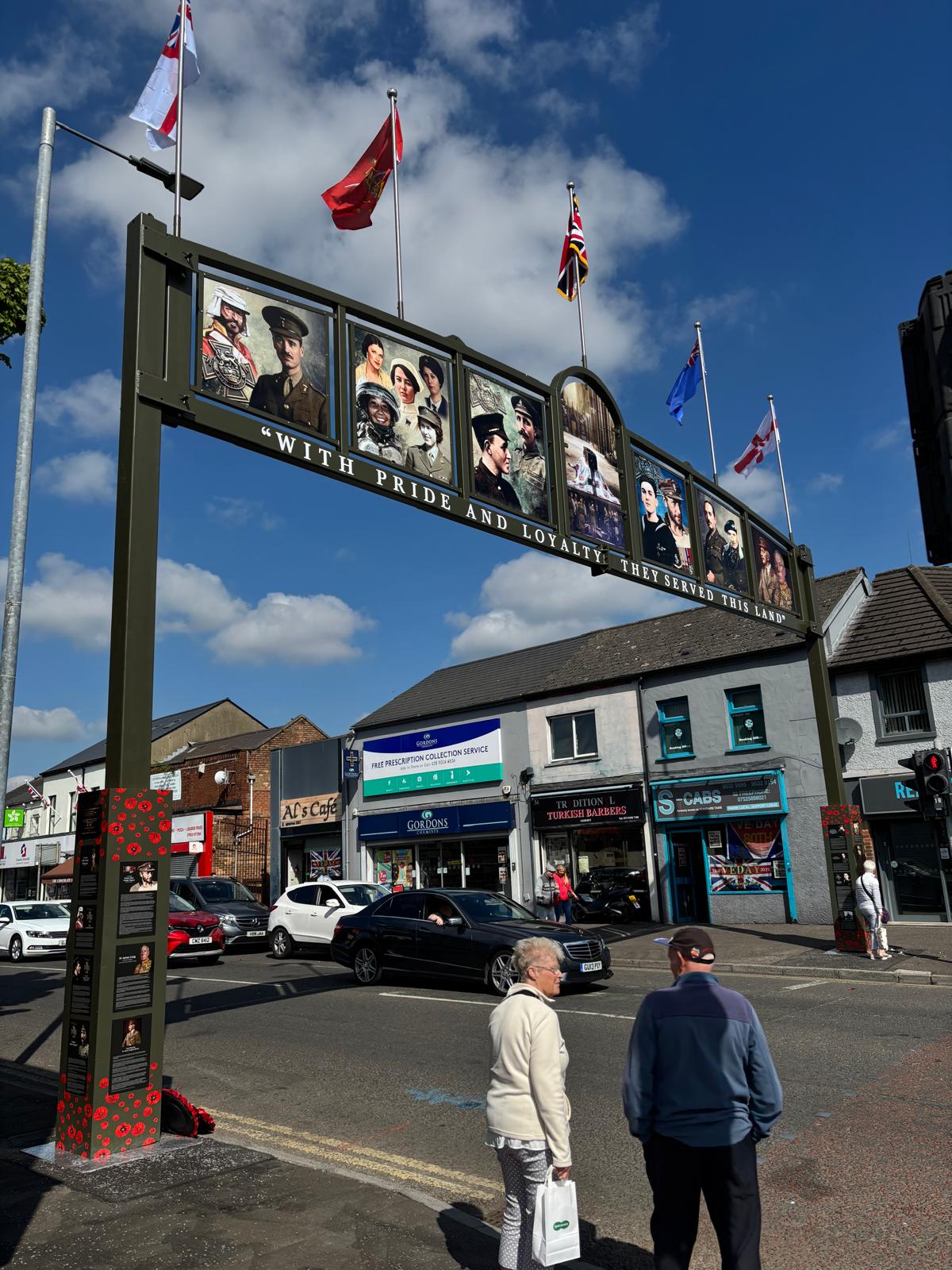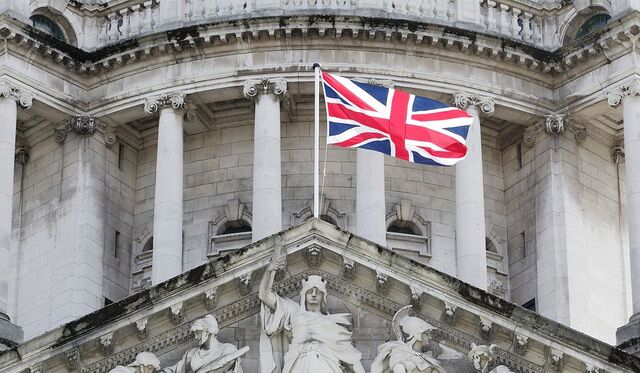YOU’D have to ask somebody who knows a lot more than I do about military history why VE Day in this little corner of Paradise was marked by duvet-sized union jacks, sword-dancing and loyalist bands.
Given that there are very few Catholic families in the North without connections to the British military and World War II (the Great War is a story for another day), you’d think it would have occurred to somebody that perhaps a bit of Irish dancing might have been an important if modest acknowledgment of the part Papist privates played in the defeat of fascism in Europe. Maybe a word or two in Irish would have been a nod to the fact that those awaiting the order to advance were as likely to be kissing rosary beads as humming a hymn. But no, the Loyal Ulster VE Day events told us in no uncertain terms that those from here who fought the Nazis were True Blue to the core.
Not that the sectarianising of the 80th anniversary celebrations was the worst of the past week. For me the most unedifying part of the entire spectacle was the simple fact that what we were witnessing was not in fact a celebration, but what’s known in post-war societies as a ‘necessary lie’. Dunkirk, for instance, was – is – a necessary lie that enabled a country to maintain the morale of the population by pretending that it was a triumph of the human spirit and not a devastating military reversal that brought the Nazi hordes to Britain’s garden gate. And in pointing to that simple truth I’m not saying the lie was wrong; I’m saying that it was a vital and brilliant propaganda coup, as crucial to the British war effort as tanks, ships and planes; and I’m saying that the maintenance of that lie is necessary today for the maintenance of the myth of British exceptionalism and the continuing belief that Churchill won the war by himself.
The biggest necessary lie of WWII, of course, was – is – the contention that an effective guerrilla war was carried on against the Bosch by a massive underground army of French patriots. In fact the Resistance was a disparate and undefined rump comprised in grotesque disproportion of jaw-droppingly courageous communists and Jews. Charles de Gaulle claimed his Free French Army was the Resistance, a claim he made not from a Parisian cellar or a mountain hideout in the Vosges, but from the serene hotel foyers and fashionable salons of London. Again, I must stress I’m not judging here from 80 years away. I know the lie was a necessary one – and a hugely effective one. It was necessary to assuage French guilt over their abject June 1940 surrender and it was effective in manufacturing a myth of nationwide courage and pride without which there’d have been no Fourth Republic.
Which brings us to unionism’s WWII necessary lie. I’ve been looking at the census of 1937, two years before Germany set the world on fire. Conscription, when it was introduced across the water, roped in adults between the ages of 18 and 41. For a battery of reasons – not a single one of them flattering to our place in the United Kingdom – conscription wasn’t introduced here. According to the 1937 census, there were approximately 560,000 men and women of conscription age across these six counties (I’ve crudely halved the 15-19 and 40-44 age cohorts to fit the conscription cut-off). Figures for the number of people here who volunteered for the British army are frustratingly inexact, the best I can do from reviewing a range of sources is to put it at somewhere between 38,000 and 44,000 (interestingly, the number from the Republic who joined was almost the same).
Let’s cut that 560,000 figure in half to exclude women (a clumsy thing to do, I know, and insulting to women) and take a figure of 280,000 men of fighting age here. And let’s split the difference on British army volunteers from here and call it 41,000. That’s one out of every seven men here rushing off to fight the Nazis – one in seven men who deserve our respect and gratitude. But it's also 85 per cent of fighting age men who preferred the bookies and the pub to the body-strewn beaches of Normandy, the burning sands of North Africa and the freezing, mountainous waves of the North Atlantic.
RELUCTANT SOLDIER: Private William Carlin’s grave in Fontenay-le-Pesnel, Normandy
The trouble is, all of that is a dagger to the heart of partition’s foundational narrative. You can say till you’re blue in the face that this place is redder, whiter and bluer than England, Scotland and Wales; you can argue that this wee country’s place in the UK was paid for by the blood shed at the Somme by the 36th; you can claim that Britain’s call has always been answered by the sons of Ulster. But the truth remains that when the UK’s need was greatest, the vast majority of unionists turned their backs and took a charabanc to Bangor.
Don’t get me wrong, I’d have done the same. Not because I’d have been on the side of the Nazis, but because I’m pretty sure that my lifelong aversion to hot pieces of metal travelling at high speed would have convinced me not to volunteer to face Panzers and U-boats. My uncle Billy Carlin, killed in the Battle for Caen, wouldn’t have been anywhere near northwest France in June 1944 had it been up to him; rather he’d have stayed in Belfast with the vast majority of fighting-age blokes doing whatever it is that young men in their 20s do when the world around them is at war. The difference being that the home he didn’t want to be taken away from didn’t have a union jack hanging from it or a picture of the King in the living room.
Billy had worked for a number of years in England in the Royal Mint, a reserved occupation, which meant that he was exempt from conscription. He toiled away there for a while after the outbreak of war, but came home to Belfast because his wife Kathleen was desperately homesick. And – who knows? – maybe he reckoned life would be a bit less awkward for a young man not in military uniform in a city where nearly all of the fighting-age men weren’t wearing military uniforms either.
Hardly had Billy shut the hall door behind him when the Military Police came to his family home in Nail Street, in the shadow of St Peter’s pro-cathedral, took him back to England and forced him to sign up for the East Lancashire Regiment. And that, readers, was how Billy Carlin, 27, came to be buried in the military cemetery at Fontenay-le-Pesnel in the Calvados department of Normandy. I sometimes wonder if he got to enjoy a glass or two of the region’s famous apple brandy before he died and, if he did, was he thinking of his many peers in Belfast sipping tea and following his war through the wireless?
I don’t celebrate Billy’s role in fighting the Nazis because, quite simply, Billy didn’t want to fight the Nazis. I can be – and I am – quietly proud of the fact that for whatever reason my uncle was part of the great global apparatus that overcame fascism, but the personal tragedy of Billy and his wife casts a shadow over his service that’s too dark for me to see through. Going by the stats, though, the vast majority of those across the North out last week enjoying the bands, the sword-dancing and the union jacks were celebrating despite the fact that their loved ones most likely decided in the 1940s that fighting the Nazis was best left to the Brits.
Toward the end of the classic western The Man Who Shot Liberty Valance, political heavyweight Ranse Stoddard reveals to a small group of journalists the truth about his rise to the top: As a young man Ranse didn’t save the town of Shinbone from the eponymous outlaw Valance, though his reputation was built on that perception. The whip-cracking gunslinger had in fact been killed by his friend Tom Doniphon, who has just died in anonymity and been buried in a plain deal coffin after a small and simple ceremony. Ranse Stoddard’s jawdropping confession, made as an act of redemption on the day of his friend’s funeral, will end his Presidential aspirations. But newspaper editor Maxwell Scott stands, rips up his notes and throws them in the pot-bellied stove. A bemused Ranse asks: “You’re not going to use the story, Mister Scott?” The reply comes: “This is the West, sir. When the legend becomes fact, print the legend.”
And print the legend they did. For a week Loyal Ulster did its best to convince its UK neighbours – and more importantly itself – that Belfast’s record of sacrifice and heroism was the same as Birmingham’s, or Glasgow’s, or Cardiff’s. It wasn’t. Loyal Ulster did no more to save Europe from the Nazis than Disloyal Ulster did. Recruiting officers were left as generally unbothered by the men of the Shankill as they were by the men of the Falls. Only a very few of the graves of Belfast men of fighting age in the 1940s are in France, or Libya or on the ocean floor. The vast majority are in council cemeteries and they read ‘Died peacefully in his bed.’
If the 80th anniversary of the truth had been marked, instead of the 80th anniversary of the necessary lie, we’d all have stayed at home last week.
Just like my uncle Billy wanted to.








